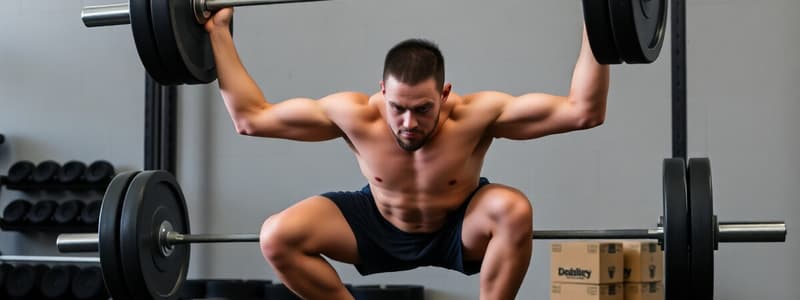Podcast
Questions and Answers
A powerlifter aiming to increase maximum strength incorporates plyometric exercises into their routine, believing it will enhance explosive power in lifts. Considering the Specificity Principle, how effective is this addition and why?
A powerlifter aiming to increase maximum strength incorporates plyometric exercises into their routine, believing it will enhance explosive power in lifts. Considering the Specificity Principle, how effective is this addition and why?
- Counterproductive, as plyometrics can fatigue fast-twitch muscle fibers needed for heavy lifting, hindering strength gains.
- Moderately effective, as plyometrics improve general athleticism, which indirectly benefits powerlifting performance by enhancing agility.
- Highly effective, as plyometrics directly translate to improved force production in maximal lifts due to increased muscle fiber recruitment.
- Minimally effective, as plyometrics primarily target rate of force development, which is less crucial for maximal strength compared to maximal force. (correct)
During a high-intensity resistance training session, a weightlifter performs multiple sets to failure. How does the body primarily adapt to this type of training over time?
During a high-intensity resistance training session, a weightlifter performs multiple sets to failure. How does the body primarily adapt to this type of training over time?
- Increased flexibility and range of motion in joints to prevent injury.
- Hypertrophy of muscle fibers and increased recruitment of motor units. (correct)
- Increased mitochondrial density in muscle fibers to enhance endurance capacity.
- Enhanced cardiovascular efficiency to improve oxygen delivery to muscles.
An athlete wants to improve their performance in a sport requiring both high power output and sustained muscular endurance. Which training strategy BEST combines these two adaptations?
An athlete wants to improve their performance in a sport requiring both high power output and sustained muscular endurance. Which training strategy BEST combines these two adaptations?
- Alternating between high-intensity interval training for power and long-duration, low-intensity cardio for endurance.
- Focusing solely on heavy resistance training to maximize strength gains.
- Performing plyometric exercises followed by high-repetition resistance training in the same workout. (correct)
- Prioritizing flexibility and mobility exercises to improve movement efficiency.
A sprinter is looking to improve their start time. Besides leg power, which of the following factors would contribute MOST to an improved start?
A sprinter is looking to improve their start time. Besides leg power, which of the following factors would contribute MOST to an improved start?
An endurance cyclist wants to improve their lactate threshold. Which training adaptation would directly contribute to this goal?
An endurance cyclist wants to improve their lactate threshold. Which training adaptation would directly contribute to this goal?
Flashcards
Specificity Principle
Specificity Principle
The principle stating training should match the desired outcome.
Plyometric Exercises
Plyometric Exercises
Exercises that use quick, powerful movements, like jumping.
Maximal Strength
Maximal Strength
The ability to produce maximal force, key in powerlifting.
Rate of Force Development (RFD)
Rate of Force Development (RFD)
Signup and view all the flashcards
Plyometrics for Powerlifting?
Plyometrics for Powerlifting?
Signup and view all the flashcards
Study Notes
- Plyometric exercises are incorporated into a powerlifter's routine to increase maximum strength by enhancing explosive power in lifts.
- The effectiveness of this addition is analyzed using the Specificity Principle.
- The Specificity Principle states that training should be specific to the desired outcome.
- Option A is the correct answer: Minimally effective, as plyometrics primarily target rate of force development, which is less crucial for maximal strength compared to maximal force.
- Plyometrics mainly target rate of force development.
- Rate of force development is less crucial for maximal strength compared to maximal force.
Studying That Suits You
Use AI to generate personalized quizzes and flashcards to suit your learning preferences.




